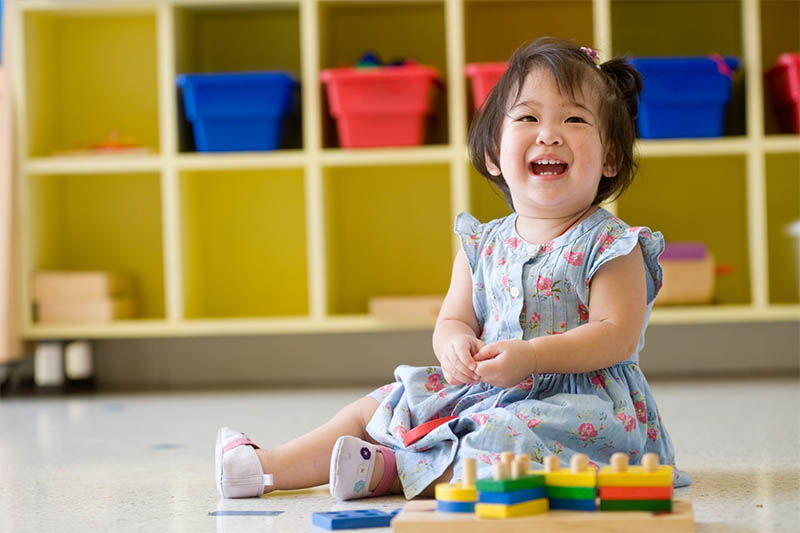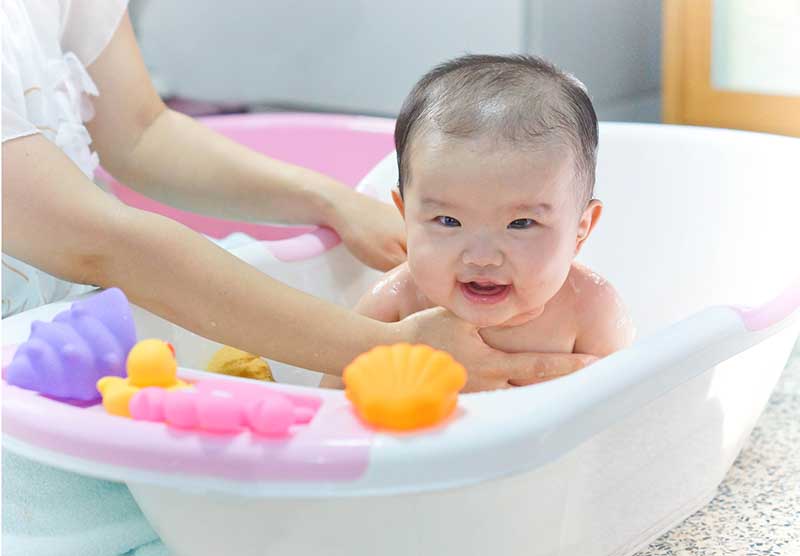Families For Life | 2-3 years: Toddler Development

Children come in all shapes and sizes but development at 2-3 years typically has some things in common. Here is what might be happening for your child, how you can help, and when to see a child health professional for a qualified assessment.
Toddler development at 2-3 years: what is happening
Feelings
This is one of your child’s most important ages for emotional development.
Your toddler is going through many emotions, while also learning about other people’s feelings.
Tantrums are common, because your toddlers can't always communicate their needs. They often don’t know how to put words to ‘big’ emotions like frustration, anger, embarrassment, guilt and shame.
Your toddler is also starting to understand how their behaviour affects you and how your behaviour affects them.
Your toddler might not get so upset when you leave them. But they’ll still want a lot of your attention and might cling to you when they’re tired or frightened – or just want a cuddle.
Talking
Around 2 years, toddlers might be able to use sentences of 2-3 words and say ‘I’, ‘you’ and ‘me’. Your toddler is learning and using a lot of words and might be easier to understand when talking.
At 3 years, toddlers can usually use sentences of 3-5 words, or even more. Your toddler starts learning how to take turns when speaking and might be able to have a short conversation with you.
Your toddler is learning how to talk about things that have happened during the day. With your help, your toddler might be able to put things in order to make a simple story – for example, ‘I go shop’. ‘And what did you do at the shop?’ ‘Buy milk.’ By 3 years, your toddler might be able to tell a simple ‘made-up’ story based on their own experiences, but it will probably be quite short.
At this age your toddler will also talk about people and objects that aren’t with them – for example, ‘Grandma at the shops’ or ‘My ball in tree’.
Thinking
Everything toddlers have learned so far has developed their thinking.
Your toddler is starting to understand concepts like time and opposites – for example, big/small and day/night. Your toddler is also starting to point to body parts based on what they do, sort objects, and match shapes and colours. And your toddler is starting to remember what some things look like – for example, apples look red and round.
Your toddler solves problems by trying things out
Playing and learning
Play is important because it is
how children learn.
Your toddler enjoys playing with others, playing dress-up, having tea parties, finger painting, and
rough and tumble play. When your toddler plays with you or other children, you might find that your toddler is getting better at taking turns.
Telling stories, singing and reading are also fun things for your toddler to do at this age.
Everyday skills
Around this time, toddlers are keen to do more things for themselves.
For example, your toddler can probably wash their own hands, wash themselves at bathtime, feed themselves and get dressed – although your toddler is probably better at taking clothes off than putting them on! And your toddler is still learning, so you might still need to help.
You can build your toddler’s confidence and independence by letting them help you around the house with chores like sweeping or dusting. Your toddler feels very proud when they’re a good helper.
Your toddler might even be ready to start toilet training.
Movement
At this age, toddlers can run and will probably fall less. Your toddler is starting to walk up and down stairs on their own, putting both feet on each stair and using the rail or wall for balance. Your toddler can probably kick a ball and might even stand on one foot for a few seconds. Your toddler is better at throwing overarm and catching. They probably use their preferred hand to do these activities.
If you’re around while your toddler explores, they’ll feel reassured and safe. This helps your toddler build confidence to try new things and explore on their own.
With your toddler so active, it’s a good idea to look at how you can make your home safe. At this age, your toddler might also:
jump on the spot
ride a tricycle
recognise objects and name them
use one foot and then the other foot when walking up stairs.
Helping toddler development at 2-3 years
Here are some simple things you can do to help toddler development at this age:
Give your toddler the chance to play with others: play is a great way for your toddler to make friends and learn how to be with other children. But don’t expect sharing and taking turns just yet – toddlers think that everything belongs to them.
Encourage everyday skills like using a spoon, drinking from a cup and taking off a hat. These skills involve both small and big muscle movements, as well as your toddler’s ability to think about what they're doing.
Talk with your toddler: naming and talking about everyday things – body parts, toys and household items like spoons or chairs – helps develop your child’s language skills. At this age, you can teach your toddler that a ‘chair’ can be a ‘big chair’, ‘red chair’ or even a ‘big red chair’.
Give meaning to your toddler’s talking by listening and talking back to him. If your toddler says ‘Mama milk’, you might reply by saying ‘You want Mum to get you some milk?’ This also makes your toddler feel valued and loved.
Read to your toddler: you can encourage your toddler’s talking and imagination by reading together, telling stories, singing songs and reciting nursery rhymes.
Do some cooking with your toddler: this helps your toddler to get interested in healthy food, learn some new words, and understand maths concepts like ‘half’, ‘1 teaspoon’ or ‘30 minutes’. You can give your toddler simple things to do, like tossing a salad or putting together sandwiches.
When your toddler learns a new skill, celebrate the achievement with plenty of praise and
positive attention. It's also a good idea to help and encourage your toddler to keep doing the things they've learned, even if those things are difficult.
Parenting toddlers at 2-3 years
As a parent, you’re always learning. It’s okay to feel confident about what you know. And it’s okay to admit you don’t know something and ask questions or get help.
It’s also important to look after yourself. Looking after yourself physically, mentally and emotionally is good for you, and it’s good for your toddler. When you’re well, you can give your toddler the loving attention they need to grow and thrive. You can also guide your toddler’s behaviour in positive ways, even when you find their behaviour challenging.
And remember that part of looking after yourself is asking for help, especially if you’re feeling stressed, anxious or angry. There are many people who can support you and your toddler, including your spouse, friends, relatives and General Practitioner.
Never shake a toddler. It can cause bleeding inside the brain and likely permanent brain damage.
When to be concerned about toddler development at 2 years
See your paediatrician or General Practitioner (GP) if you have any concerns or notice that your 2-year-old has any of the following issues.
Seeing, hearing and communicating
Your toddler:
has trouble seeing or hearing things
isn’t using two words together – for example, ‘Red car’ or 'me go too'
can't follow simple instructions - for example. 'Get your shoes, please'.
Behaviour and play
Your toddler:
doesn’t copy actions or words – for example, when singing ‘Heads, shoulders, knees and toes’
doesn’t pretend during play – for example, doesn’t pretend to have a tea party or feed a doll
isn’t showing feelings
doesn’t come to you for affection or comfort.
Movement and motor skills
Your toddler:
cannot walk up and down stairs, even if holding on to you or a rail
can't run
finds it hard to handle small objects - for example, a pencil or crayon
isn't scribbling or trying to draw.
When to be concerned about toddler development at 3 years
See your paediatrician or General Practitioner (GP) if you have any concerns or notice that your 3-year-old has any of the following issues.
Seeing, hearing and communicating
Your toddler:
does not look you in the eye
has trouble seeing or hearing things
is not using 3-word sentences
doesn't understand 2-part instructions - for example, 'Get your shoes, and put them in the box'
is often hard to understand when talking to you, family or friends.
Behavior and play
Your toddler:
is not interested in other children
finds it difficult to separate from their primary caregiver
does not pretend during play – for example, pretend to play ‘shopping’ or ‘riding on the bus’.
Movement and motor skills
Your toddler:
can't run
isn't scribbling or drawing
finds it hard to handle small objects - for example, a pencil or crayon.
Consult a child health professional if your child loses skills previously acquired.
Also consult your paediatrician or GP if you notice signs of postnatal depression in yourself or your partner. Postnatal depression symptoms include feeling sad and crying for no obvious reason, feeling irritable, having difficulty coping and feeling very anxious.
Children grow and develop at different speeds so if you worry your child is not development normally, it helps to know ‘normal’ is subjective. Still, if you sense something out of the ordinary, see your paediatrician or GP.
© raisingchildren.net.au, translated and adapted with permission

DID YOU KNOW?
Bath time is a good way to soothe your baby but it can also be a fantastic learning opportunity for your child. Learn how you can engage him during bath time.
READ MORE